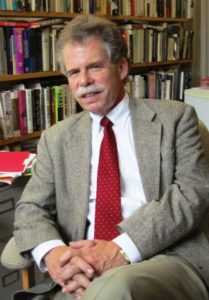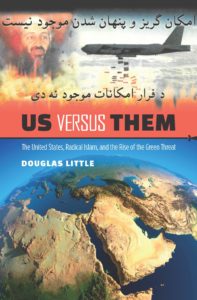From Desert Storm to ISIS


Clark University history Professor Douglas Little’s newest book, “Us versus Them: The United States, Radical Islam, and the Rise of the Green Threat,” examines the political and cultural conflicts that triggered America’s shift in attention from the “Red Threat” of communism to the “Green Threat” of radical Islam after 1989.
“Us versus Them” (University of North Carolina Press, 2016) shows that U.S. policymakers employed the same ideological framework historically used against Native Americans, Asian immigrants, and Soviet communists to demonize Muslim radicals.
The book grew out of a research seminar in which Little and a dozen Clark undergraduates explored America’s troubled relationship with the Muslim world after the fall of the Berlin Wall. Although American leaders hoped that the end of the Cold War would enable the United States to redefine its diplomatic relationships in the Middle East and elsewhere, Little demonstrates that from Operation Desert Storm in 1991 to Obama’s battle against ISIS today, U.S. foreign policy has been governed by “us versus them” thinking, with Islamophobia supplanting the threats of yesteryear.
 “With crisp and witty prose, the book is by far the liveliest read in its field, and Little demonstrates a mastery of sources with the sure hand of a mature historian who knows not only the topic of U.S. relations with the Middle East, but also the broad sweep of U.S. history,” wrote Frank Costigliola, of the University of Connecticut. “No book presently on the market commands the strengths of ‘Us versus Them.’ ”
“With crisp and witty prose, the book is by far the liveliest read in its field, and Little demonstrates a mastery of sources with the sure hand of a mature historian who knows not only the topic of U.S. relations with the Middle East, but also the broad sweep of U.S. history,” wrote Frank Costigliola, of the University of Connecticut. “No book presently on the market commands the strengths of ‘Us versus Them.’ ”
Peter Hahn, of Ohio State University, adds: “Douglas Little’s cogent, perceptive, and well-reasoned work emerges as one of the best books on recent U.S. diplomacy across the Middle East. Moving energetically through twenty-five years of U.S. diplomacy, Little’s compelling and memorable thesis will draw more visibility and attention to his work than that enjoyed to date by any other book on this subject.”
Professor Little is the Robert H. And Virginia N. Scotland Chair in History and International Relations. He specializes in American diplomatic history but also offers courses in 20th-century America and U.S. relations with the Middle East. His next research project will focus on Ronald Reagan’s foreign policies in the Middle East.
Little has been at Clark University since 1978, and also is affiliated with the Clark program in Asian Studies. He received a B.A. from the University of Wisconsin and an M.A. and Ph.D. from Cornell University.
Other books by professor Little include, “American Orientalism: The United States and the Middle East since 1945” (University of North Carolina Press, 3rd edition) and “Malevolent Neutrality: The United States, Great Britain, and the Origins of the Spanish Civil War” (Cornell University Press).
Founded in 1887 in Worcester, Massachusetts, Clark University is a liberal arts-based research university addressing social and human imperatives on a global scale. Nationally renowned as a college that changes lives, Clark is emerging as a transformative force in higher education today. LEEP (Liberal Education and Effective Practice) is Clark’s pioneering model of education that combines a robust liberal arts curriculum with life-changing world and workplace experiences. Clark’s faculty and students work across boundaries to develop solutions to complex challenges in the natural sciences, psychology, geography, management, urban education, Holocaust and genocide studies, environmental studies, and international development and social change. The Clark educational experience embodies the University’s motto: Challenge Convention. Change Our World.


